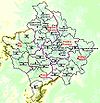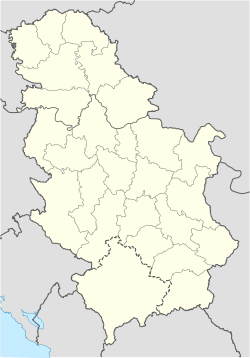- Novo Brdo
-
Novo Brdo — Municipality and city — Ново Брдо (Novo Brdo)
Novobërdë (Artanë)Location in Serbia Coordinates: 42°36′N 21°26′E / 42.6°N 21.433°ECoordinates: 42°36′N 21°26′E / 42.6°N 21.433°E Country Kosovo[a] District District of Pristina Population (2011) – Total 6,720 (municipality) – Density 32.9/km2 (85.2/sq mi) Time zone CET (UTC+1) – Summer (DST) CEST (UTC+2) Postal code Area code(s) +381 38 Car plates 01 Website Municipality of Novo Brdo Novo Brdo (Serbian: Ново Брдо, Novo Brdo; Albanian: Novobërda, Novobërdë, Artana or Artanë) is a town and municipality in the Pristina district of eastern Kosovo. The population of the municipality is estimated at 6,720 people (2011).[1]
Contents
History
Novo Brdo was mentioned with its present name in historical documents as early as 1326. Previously it was known as Novaberd, Novus Mons or Novamonte in Latin and as Nyeuberghe in Saxon texts. The famous Bulgarian Mediaeval writer Vladislav the Grammarian was born there between 1410 and 1415 [1].
Novo Brdo was a metropolis at the time, with a huge medieval fortress built on the top of an extinct volcano cone, the remains of which can be visited today, and residential sections sprawling all around. In the outer wall of the fortress a large cross is visible, built into the stones. The castle, or fortress, was thought at one point to have dated back to the time of the Serbian Empire.
The population at its height was estimated to exceed 6,720 people. There were mines and smelting furnaces for iron, lead, gold and silver ores. Novo Brdo silver is known by its argentum glame (an alloy of silver with 1/6-1/3 gold). In 1450 the mines of Novo Brdo were producing about 6,000 kg of silver per year. Novo Brdo was the last Serbian city to remain standing during the first invasion. In 1439 the capital of Smederevo fell and Serbia resisted until finally Novo Brdo fell in 1441. Novo Brdo was by treaty restored to the Serbs in 1443.
The fortress (named in Turkish Nobırda) came under siege for forty days by the Ottomans, capitulating and becoming occupied by the Ottomans on June 1, 1455. This event is described by Konstantin Mihailović from Ostrovica near Novo Brdo, who was taken by the Ottomans along with some 300 other boys to be trained as Janissaries. All of the higher ranking Serbian officials were executed after the castle fell, with the younger men and boys being taken captive to serve in the Ottoman Army, and some 700 young Serbian women and girls being taken to be wives to Ottoman commanders. [2] [3] By the early 20th century, Novo Brdo's population had dwindled, with most inhabitants moving to the more easily accessible area of Gnjilane. In 1999, with the entry into Kosovo of KFOR and the United Nations Interim Administration Mission in Kosovo (UNMIK), the area had a small military outpost occupied by US soldiers, as well as a station of International Police and Kosovo Police.
Population
Ethnic Composition, Including IDPs Year/Population Albanians % Serbs % Other % Total 1961 4,358 44.78 5,271 54.17 102 1.05 9,731 1991 1,845 40.01 2,666 57.82 100 2.17 4,611 1998 2,158 43.9 2,680 54.4 86 1.7 4,924 Aug 2003 2,300 61.3 1,400 37.3 51 0.1 3,751 ref: Yugoslav Population Censuses for 1961 and 1991, and OSCE estimates for 1998 and 2003 There is no data for 1971 and 1981, as it was part of the Pristina Municipality in those censuses. In 1961 its area was a somewhat bigger than it is today.
Notable people
Gjergj Pelini (? - 1463), Albanian Catholic priest and diplomat of the League of Lezhë.
Notes and references
Notes:
a. ^ Kosovo is the subject of a territorial dispute between the Republic of Serbia and the self-proclaimed Republic of Kosovo. The latter declared independence on 17 February 2008, while Serbia claims it as part of its own sovereign territory. Its independence is recognised by 85 UN member states. References:
- ^ OSCE municipal profile of Novo BrdoPDF, April 2008.
External links
- Municipality of Novo Brdo
- OSCE municipal profile of Novo BrdoPDF, April 2008.
- Castle in Novo Brdo
- Novo Brdo youth and rural tourism network, local youth and rural tourism network. Arranges for bed and breakfast-houses and meals.
Kosovo Dečani • Đakovica • Dragaš • Glogovac • Gnjilane • Istok • Kačanik • Klina • Kosovo Polje • Kosovska Kamenica • Kosovska Mitrovica • Leposavić • Lipljan • Mališevo • Novo Brdo • Obilić • Orahovac • Peć • Podujevo • Priština • Prizren • Štimlje • Srbica • Štrpce • Suva Reka • Uroševac • Vitina • Vučitrn • Zubin Potok • Zvečan New Municipalities: Đeneral Janković • Gračanica • Junik • Klokot-Vrbovac • Mamuša • Parteš • RanilugCategories:
New Municipalities: Đeneral Janković • Gračanica • Junik • Klokot-Vrbovac • Mamuša • Parteš • RanilugCategories:- Populated places in Serbia
- Serbian enclaves in Kosovo
- Municipalities of Kosovo
Wikimedia Foundation. 2010.

